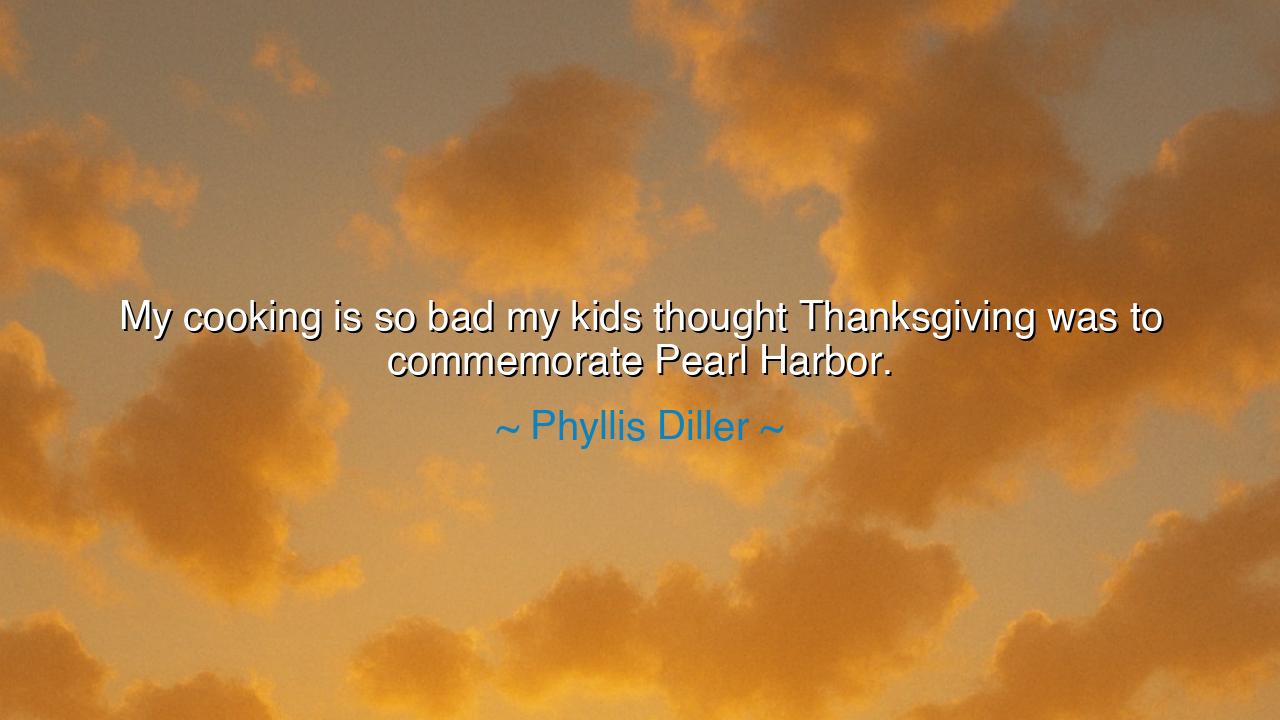
My cooking is so bad my kids thought Thanksgiving was to






"My cooking is so bad my kids thought Thanksgiving was to commemorate Pearl Harbor." In this biting jest, the comedienne Phyllis Diller wove together the threads of humor, tragedy, and tradition into one unforgettable line. On the surface, it is a quip about bad cooking—burnt dishes, inedible meals, children grimacing at the table. Yet beneath the laughter lies something deeper: a reflection on how failure, chaos, and imperfection can still be embraced within the warmth of family traditions. Her words remind us that even when the feast is ruined, the meaning of Thanksgiving is not lost.
The origin of this humor is found in the timeless art of exaggeration. By comparing her kitchen disasters to the devastation of Pearl Harbor, Diller uses shock and contrast to magnify her failure into something epic, turning embarrassment into laughter. In this way, she reveals the deeper truth: that humor is one of the great salvations of life. Where pride would cover failure with shame, humor transforms it into a story told at the table for generations to come.
History itself provides examples of this principle. In the midst of war and hardship, soldiers often survived not only on rations but on laughter. In World War II, even as bombs fell, men in trenches shared jokes and songs, for they knew that without humor the weight of despair would crush them. Likewise, Diller’s family may have sat before a meal gone wrong, but in their laughter they found joy, resilience, and a bond stronger than any recipe. Thanksgiving was never truly about the food—it was about the spirit around the table.
There is also a lesson here about imperfection and humanity. Too often we believe that feasts must be flawless, that every dish must dazzle, that every tradition must unfold in perfection. But Diller’s jest reminds us that even failure can become sacred when met with humility and laughter. The burnt turkey, the lumpy potatoes, the collapsed pie—all of these, when remembered with joy, become part of the family’s mythology, their stories passed down like treasures. In truth, it is often the imperfect moments that shine brightest in memory.
Her words also serve as a parable about perspective. To the child, the feast was a disaster so epic it seemed worthy of solemn remembrance. To the mother, it was a chance to laugh at herself. And to us, it is a lesson that gratitude is not about perfection, but about presence. Even when the food is poor, the gift of family, love, and togetherness remains. The smoke in the kitchen cannot choke out the spirit of thanksgiving if the heart remains grateful.
The lesson for future generations is this: do not measure the success of a holiday by the perfection of its dishes, but by the warmth of its spirit. If your cooking fails, laugh. If the pie burns, share the story. If the feast collapses, let gratitude rise. Teach your children that joy is greater than pride, and that a ruined meal can still become a perfect memory if the heart is humble and light. Thanksgiving is not about the turkey—it is about the love around the table.
Practical action flows from this truth. As you gather at your own feast, release the burden of perfection. Cook with love, and when mistakes come, receive them with humor. Remember that laughter can redeem disaster, and humility can sanctify failure. Tell the stories of past mishaps, for they will remind your children that joy does not require flawless meals, only grateful hearts.
Thus, Phyllis Diller’s jest, though wrapped in laughter, is in truth a flame of wisdom: humor transforms failure into joy, and imperfection into memory. Let this teaching be passed down: that gratitude does not dwell in perfect dishes, but in the spirit that knows how to give thanks, laugh loudly, and love deeply—even when the meal tastes like disaster.






AAdministratorAdministrator
Welcome, honored guests. Please leave a comment, we will respond soon